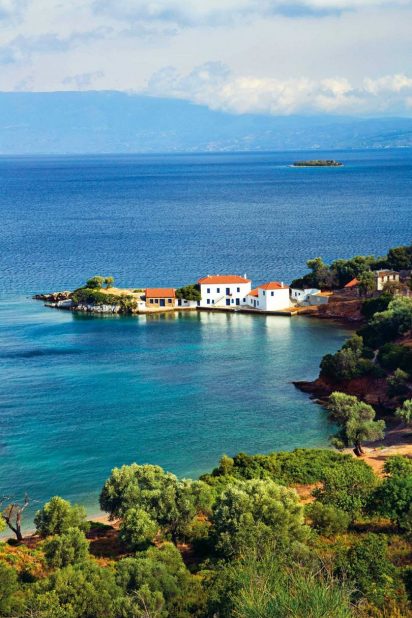Greece isn’t best known for its mainland; it’s the islands that always take the limelight. But make for Pelion and you’ll find a secret stretch of coast with sleepy fishing villages and deserted beaches, where the swimming is heaven and you can go completely off-grid
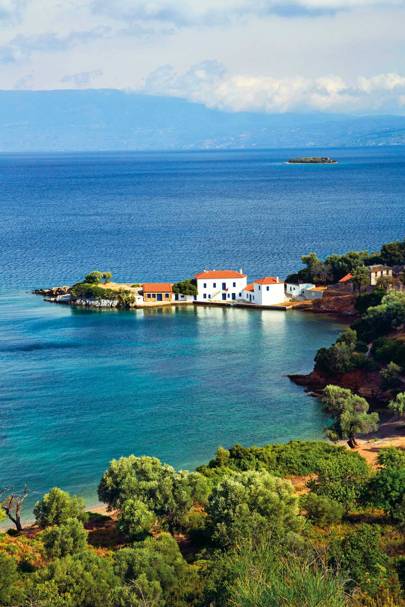
The coast along the Pelion peninsula
I usually want to go somewhere to see something old or to party somewhere new. But at the end of a month in which I had been caught up in riots in Istanbul and revolution in Cairo, a month when too many people
pointed guns in my face, I wanted to go somewhere to switch off. Somewhere all I would be obliged to do was swim, eat and sleep; where I wouldn’t have to see anything but the sun on a blue sheet of water or words on a white page.
I thought I knew Greece, but I had never heard of Pelion until friends told me about the simple stone house they were staying in, the perfect swimming, the unripened food, the joys of pine- and olive-covered slopes and deserted pebble beaches. When they went on about it as a forgotten corner of Greece, I thought maybe they were exaggerating. But they weren’t.
The peninsula pokes out into the Aegean and then bends back towards the mainland about halfway between Athens and Thessaloniki. The city of Volos and its port sit at the top of this huge bay, Mount Pelion towering above them. And a ridge of hills runs down from the mountain to the southernmost tip, its slopes as thick with chestnut forests and olive groves as they are with myths. Jason and his Argonauts sailed from Pagasae near Volos in search of the golden eece. The forested hills were home to the centaurs, half-man, half-horse, and in a cave on the slopes of Mount Pelion, the semi-divine centaur Chiron instructed Achilles before the hero went to war. This was where gods and mortals feasted together: it was at one of these that Paris was asked to choose the most beautiful woman in all the world, a conversation that led to the Trojan War. More recently, but still long ago, Christian monks came in search of retreat. Like the more famous Mount Athos, on the other side of Thessaloniki, Pelion is dotted with monasteries, some still thriving, some dating to the time of the Crusades. So if this place of respite and pleasure was good enough for gods and mystics, surely it would do for me?
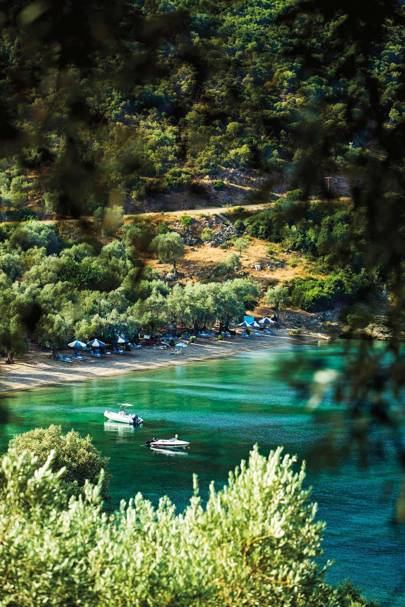
A beach on the Pagasetic Gulf
It would, and it does. I was happy the first moment I drove down the twisting coast road, even sitting behind a slow local bus. It was late in the day and the light was soft in the olive trees. Over the treetops I caught glimpses of the flat, shifting blues of the Pagasetic Gulf. For a couple of weeks I stayed close to the house I had rented, swimming off its small, stony beach in water as clear as air, making occasional visits to nearby Argalasti or one of the small seaside villages for food and drink. Day by day, the place worked its subtle, irresistible magic. But it was only when I got home, rested, tanned, exercised, restored, that I realised the full wonder of it. The more I talked about it, the more I felt I was describing a version of Greece I had known as a student, when I had slept on beaches on Serifos, Sifnos and elsewhere in the Cyclades, chased fish by day and girls at night. It was busy enough to be accessible and interesting but still relatively undeveloped. Part of the joy of Pelion is that it has no high-profile or large-scale tourism. For most travel companies, as for most of their clients, it is as off the map as the Empty Quarter.
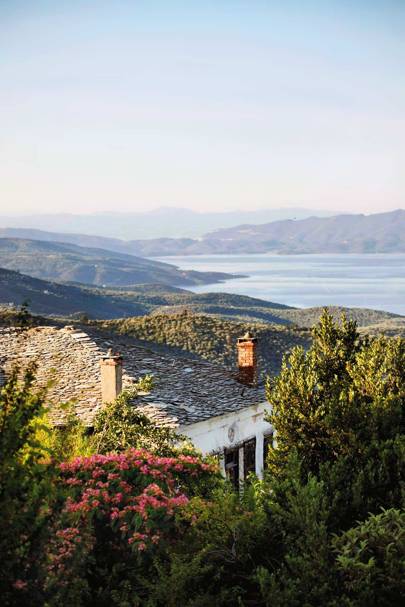
Overlooking a bay near Milies
In winter, when it snows, people come from Thessaloniki and Athens to use the chair lifts and ski down Mount Pelion. In summer, the same sort of people come to swim and sleep. Many are from old Pelion families and still
own houses in the hilltop villages. Others, like me, are foreigners and prefer to stay closer to the water. Which is to say that the place is empty. Argalasti’s Saturday market, the region’s only fresh food and farmers’ market, can get crowded with people from the peninsula alongside Greek, British and German holidaymakers buying tuna, mackerel and sardines from the back of a pick-up, or wildflower honey from an old hippie, or pickled mushrooms, dried thyme and oregano, tresses of garlic, locally pressed olive oil… But where are they the rest of the time?
If you didn’t know better, even in what passes for the high season, you might think some favoured son of the region had died. I thought that myself on my first visit to a café in Argalasti, for the owner had such a hang-dog face, but he turned out to be happy to talk. So what happened? The answer, I discovered, was that people had gone to the hills. On that first visit to Pelion, I didn’t recognise the cultural gap between villages along the coast and those in the mountains.
It is less than 80km from Volos to the tip of the peninsula, and half that distance across the spine from the gulf to the Aegean Sea. When Greece was part of the Ottoman Empire, imperial collectors extracted tax from the ports but were less successful up the slopes (their modern counterparts seem to have similar issues). For that reason, most people chose to live in the hills, coming down to makeshift huts and houses if they needed to work their fields or harvest trees. Long before the road ran down the coast, a network of stone-paved paths – kalderimi – linked the upper settlements. From these centres of commerce and culture, other paths led to the ports along which villagers carried chestnuts, cheese, cured meats, leathers, silk and whatever else they could trade down those vertiginous slopes to the sea. Life changed in the 19th century when cheap British fabrics put some of the region’s silkmakers out of business. Some went to Egypt, where they made fortunes in cotton and tobacco. Many sent money home to build huge neoclassical mansions, which still decorate the peninsula and add grandeur to old villages.
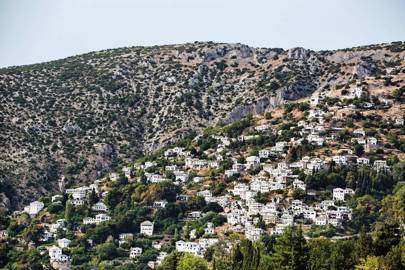
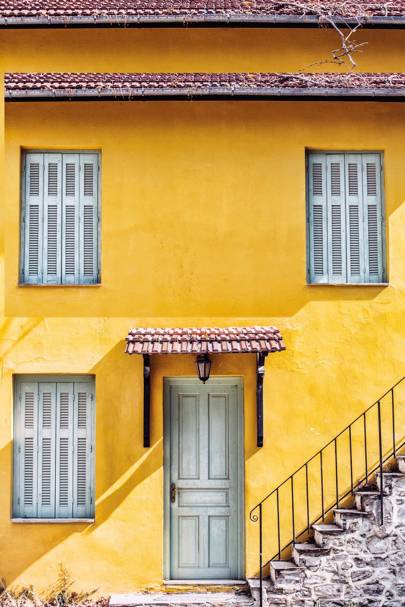
A house in Milies
The kalderimi, not the mansions (arhondika), lured me to the hills, for I had heard talk of the paths and also of traditional restaurants, such as one above Paltsi beach where an old mama cooks rabbit stew in her wood-fired oven, and of Stephanis’ tsipouro café in Agios Georgios, where in return for ordering a small bottle of the local ouzo-style drink, the patron brings plates of fresh fish and salads. It was up in the hills that I discovered the crowds: on a warm summer evening, restaurants in the squares of Agios Georgios, Tsagarada, Mouresi, Lafkos and many other villages do brisk trade serving large families late into the evening.
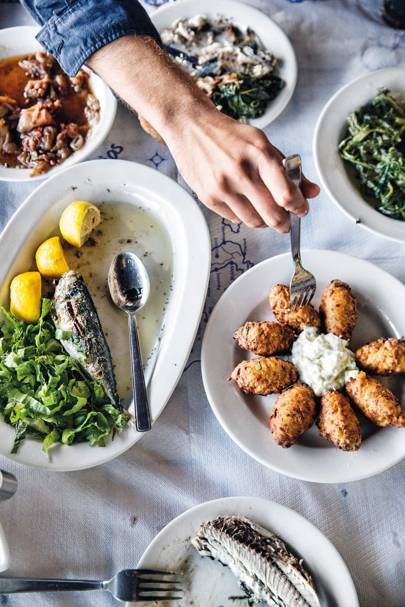
O Kostas tavern
But it is neither the inspiring history, the beautiful walks, grand houses nor delicious hillside restaurants that lure me back to Pelion. It is the coast. Each day when I wake, over a breakfast of yoghurt and the hippie’s honey, or bread from one of the wood-fired bakeries, or huge, dribbling peaches from the market, I look to the sky and for any movement of the olive trees. On a still day I might drive to the east coast, where the Aegean will be flat and a gentle breeze will take the edge off the heat. Everyone has their favourite Aegean beach – Veneto up in the north, or Milopotamos, divided in two by a huge stone arch, or Damouchari where they filmed scenes for Mamma Mia! and where Apostolis keeps a good taverna and hotel, or Katigiorgis with its sand beach and excellent fish at Taverna Areti.
But mine are Mikro, at the end of a road that feels as though it will drop straight into the deep blue, and Paltsi, as unassuming a place as you can find along the coast, a broad, stony stretch hemmed in by very steep, green hills. There are a few houses on Paltsi, and some rooms to rent. On weekends it can be busy with a scattering of young couples huddled under umbrellas, a score of extended families spread over the foreshore, and a few campervans parked up by the row of trees at the back of the beach. Someone might have dragged a dinghy with an outboard down to the water, which shelves steeply. I like to swim into the bay and around the headland, disturbing shoals of small sardines and whitebait, tracing the outlines of blocks of stone that are so large and straight-cut they look man-made. After swimming, there’s lunch at my favourite beach taverna, O Kostas, which should be known as the Swallow Café for the number of birds nesting in the rafters. They swoop overhead, the breeze shimmies off the sea and mama sends dishes out of the kitchen: fried calamari, a stew of squid and onions, some crispy fish and a spectrum of vegetables from white beans and purple beetroot to green horta (literally ‘weeds’).
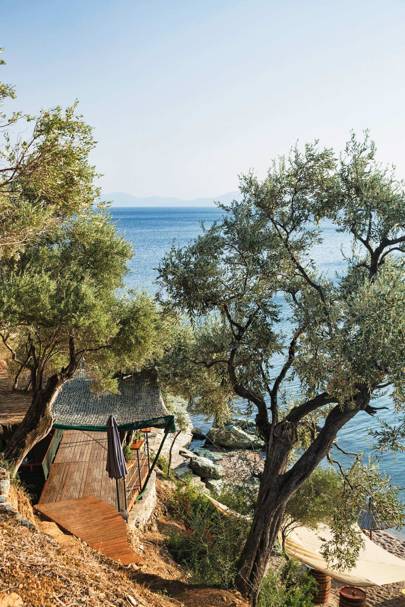
Canopies among the trees above Afissos beach
There is a unity to Pelion, and whether I am lingering over lunch at Paltsi, walking high up on the mountain in the north or driving the coast road, the view is mixed from the same ingredients of blue sea, steep green slopes, yellow stone, the same scent of dried herb and pine, the same tune of cicadas, the same sense of reverie that ooded over me the first time I came and has done so on each subsequent visit. Now, as I write this, the image that is most prominent in my thoughts is of sitting on the terrace of the house late at night, moonlight dazzling water in the bay. Occasionally there are car lights on the opposite shore, or an owl in the grove, or a truck on the road, but mostly there is nothing but silence and stillness, ideal conditions for dreaming while still awake, for letting the mind roam through shadows, recovering stories that had retreated and insights long faded. Then, just as I am lost in thought, a line of fishing boats cuts across the view from right to left, leaving Volos towards the sea, big lights on their booms to attract a catch. In their wake they tow more dreams and memories, of Jason leaving on his adventure, of Achilles sailing for Troy, and of the words of the poet Cavafy who wrote about the joy of a journey, of entering harbours for the first time. One day soon I will have to leave on another journey. Before then, there will be days on white stones and in blue water, nights in the dark scented grove in this place we’d never heard of, to which I find myself wanting to return.

